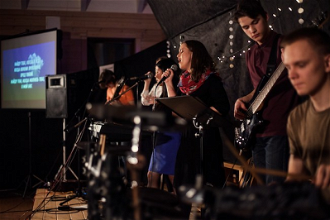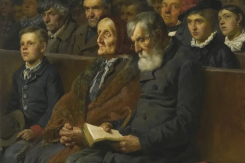La Mala Educacion (Bad Education)
Pedro Almodovar is Spain's leading director, with a strong international reputation and two Oscars (for All About My Mother and Talk to Her). He was initially provocative with his films of the 1980s, especially in his attitude towards the Catholic Church and in his treatment of sexuality, especially of homosexual themes and characters.
In recent years, he has perfected his style, his ability to create intelligent melodramas, channel his flamboyant still into thoughtful and moving explorations of the human experience, often bizarre experiences. All About My Mother won the Ecumenical award at Cannes in 1999.
Bad Education has been in planning stages for many years. In 2002, when Almodovar announced that he would move into production, there were immediate claims that the film would be anti-clerical. It would be a film about his own experiences of Catholic education in Spanish schools of the 1960s. This was re-iterated in articles and interviews and was the first question at the press conference in Cannes where Bad Education was the film chosen for Opening Night.
However, Almodovar himself has been disclaiming the anti-clerical charge. He has said that had he made the film twenty years earlier, it would have been quite anti-clerical. He says now that he has mellowed and that, although he does not have what he calls 'the luxury' of believing in God he values much of what he experienced in the Church (especially in liturgies, celebrations and art) during his childhood. He says he asked God to give him faith when he was a boy but God did not give it to him. He also said recently that the priests at school said that watching films was a sin and that he had to choose sin. These themes are incorporated into Bad Education.
The other aspect of the film that hit the headlines before its release was that of sexual abuse. While not experiencing it himself at school, he was aware of 'it' English-speaking countries have been aware of this widespread problem since the 1990s, culminating in the US crisis in 2002. The issue is beginning to emerge more forthrightly in continental European countries. While the issue is important, Almodovar treats it quite differently from the way it was portrayed, for example, in the recent Song for a Raggy Boy, where the audience briefly saw the truly abusive side of unscrupulous behaviour and the pain of the victim. Almodovar spends more time showing the emotional behaviour of the abusing priest, his obsession and emotional immaturity, but puts more blame on
how the priest handles the situation and jealously exploits his authority and power within the school. This is portrayed in the visualizing of a story written later by the victim. We then see the priest in real life, having left the priesthood and married, but still a sexual predator.
Almodovar's treatment of abuse is more complex and thoughtful than what might have been expected. His judgements are mellowed at times with some compassion for the emotions of the perpetrator. His sympathies are with the victims, although he also raises questions about adolescent attitudes towards sexuality, especially in the context of Catholic upbringing, Church teaching and a sense of sin.
Almodovar is a very clever writer and is able to construct quite intricate plots. For its full impact, the film needs to be seen with as little knowledge about its structure as possible. Audiences will leave with a great deal to think about concerning all the central characters, about what is real, about what is memory, about sexual orientation, about sexual intimacy, about childhood experiences and their effect on adult development or the impeding of development, about moral choices and about God and religion.
To put all this into a proper perspective, it is necessary to acknowledge what Almodovar has said in many interviews. That, perhaps, he should not have called his film Bad Education because the past in the school sequences is only one of about half a dozen plot segments, that he sees the school sequences as a launching place for his interest in his characters as adults and how they interact.
Bad Education offers an opportunity to see something of abuse issues dramatized. For many people, for Catholics, the stories are often sensational headlines, condemnatory articles, court cases where justice must be done and where people in the Church have to accept responsibility. They do not have a sense of the stories, of the human dimension of what victims have experienced, what abusers have done. In this sense Almodovar's film contributes to the Church's continuing examination of conscience, especially in some countries which have not yet faced the crises experienced in the United States and other places.
LONDON - 25 May 2004 - 570 words


















